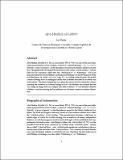Por favor, use este identificador para citar o enlazar a este item:
http://hdl.handle.net/10261/168518COMPARTIR / EXPORTAR:
 SHARE
BASE SHARE
BASE
|
|
| Visualizar otros formatos: MARC | Dublin Core | RDF | ORE | MODS | METS | DIDL | DATACITE | |

| Campo DC | Valor | Lengua/Idioma |
|---|---|---|
| dc.contributor.author | Thiele, Jan | es_ES |
| dc.date.accessioned | 2018-08-09T18:12:14Z | - |
| dc.date.available | 2018-08-09T18:12:14Z | - |
| dc.date.issued | 2018 | - |
| dc.identifier.citation | Encyclopedia of Medieval Philosophy: 1-4 (2018) | es_ES |
| dc.identifier.isbn | 978-94-024-1151-5 | - |
| dc.identifier.uri | http://hdl.handle.net/10261/168518 | - |
| dc.description.abstract | Abū Hāshim al-Jubbāʾī (b. 861 or, more likely, 890; d. 933) was one of the most influential representatives of Muʿtazilism, a school of “rational theology” – or ʿilm al-kalām (literally “science of speech”) as the discipline is termed in the Islamic intellectual tradition. He significantly developed the doctrinal system of the “School of Baṣra,” and his followers are sometimes called after him “Bahshamiyya” or “Bahāshima.” The most important element of Abū Hāshim’s metaphysical thinking was his development of the so-called theory of “states” (pl. aḥwāl, sing. ḥāl). According to this doctrine, the qualifications of beings have an ontological reality that is neither described by existence nor nonexistence. The theory helped him to explain the nature of God’s attributes without asserting the existence of co-eternal beings in God. Abū Hāshim also claimed that the very being of things does not collapse into their existence. It was therefore debated whether or not his teaching had an influence on Avicenna’s essence-existence distinction. | es_ES |
| dc.description.sponsorship | This work was funded by the Spanish Government’s Ramón y Cajal programme (RYC-2015-18346). | es_ES |
| dc.language.iso | eng | es_ES |
| dc.publisher | Springer Nature | es_ES |
| dc.relation | info:eu-repo/grantAgreement/MINECO/Plan Estatal de Investigación Científica y Técnica y de Innovación 2013-2016/RYC-2015-18346 | es_ES |
| dc.relation.isversionof | Postprint | es_ES |
| dc.rights | openAccess | es_ES |
| dc.subject | Abū Hāshim al-Jubbāʾī | es_ES |
| dc.subject | kalām | es_ES |
| dc.subject | Islamic theology | es_ES |
| dc.subject | philosophy | es_ES |
| dc.title | Abū Hāshim al-Jubbā’ī | es_ES |
| dc.type | capítulo de libro | es_ES |
| dc.identifier.doi | 10.1007/978-94-024-1151-5_608-1 | - |
| dc.description.peerreviewed | Peer reviewed | es_ES |
| dc.relation.publisherversion | https://doi.org/10.1007/978-94-024-1151-5_608-1 | es_ES |
| dc.contributor.funder | Ministerio de Economía y Competitividad (España) | es_ES |
| dc.relation.csic | Sí | es_ES |
| oprm.item.hasRevision | no ko 0 false | * |
| dc.identifier.funder | http://dx.doi.org/10.13039/501100003329 | es_ES |
| dc.contributor.orcid | Thiele, Jan [0000-0002-8865-5997] | es_ES |
| dc.type.coar | http://purl.org/coar/resource_type/c_3248 | es_ES |
| item.languageiso639-1 | en | - |
| item.fulltext | With Fulltext | - |
| item.openairecristype | http://purl.org/coar/resource_type/c_18cf | - |
| item.cerifentitytype | Publications | - |
| item.grantfulltext | open | - |
| item.openairetype | capítulo de libro | - |
| Aparece en las colecciones: | (CCHS-ILC) Libros y partes de libros | |
Ficheros en este ítem:
| Fichero | Descripción | Tamaño | Formato | |
|---|---|---|---|---|
| EMP_AbuHashimJubbai.pdf | 60,52 kB | Adobe PDF |  Visualizar/Abrir |
CORE Recommender
Page view(s)
903
checked on 24-abr-2024
Download(s)
479
checked on 24-abr-2024
Google ScholarTM
Check
Altmetric
Altmetric
NOTA: Los ítems de Digital.CSIC están protegidos por copyright, con todos los derechos reservados, a menos que se indique lo contrario.
